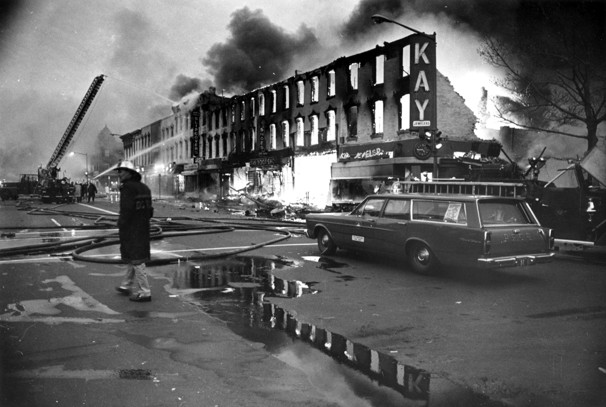 Forty Five years ago today, we entered the Post-Dr. King era. We are still in that era and likely judging by his standard of equal justice for all citizens, the light cannot be seen at the end of tunnel. Today, 45 years ago, cities across the U.S. burned. Washington D.C., my hometown, was on fire downtown. People were killed, stores were destroyed, and “white flight,” that permanent idea in America that was already underway, sped up.
Forty Five years ago today, we entered the Post-Dr. King era. We are still in that era and likely judging by his standard of equal justice for all citizens, the light cannot be seen at the end of tunnel. Today, 45 years ago, cities across the U.S. burned. Washington D.C., my hometown, was on fire downtown. People were killed, stores were destroyed, and “white flight,” that permanent idea in America that was already underway, sped up.
Whites began exiting the cities quicker and with it went the tax base that help keeps the cities functioning well especially so in a historically unequal society where one group has no wealth and the other has much wealth. They took their wealth and their services and their political clout and the cities, most of them, began falling apart as was easily predicted. Not that the black citizens left behind didn’t want great cities with efficient, responsive government. This just takes cash and the cash began to leave when Dr. King was killed. The riots made that just happen fast.
Lyndon Johnson, President of the United States at this time, had already announced he wouldn’t run for President. The day after Dr. King was killed he not only had to deal with the riots but he urged his colleagues in Congress to pass a fair housing law King wanted passed. On April 11, 1968, it was passed though it was weak and watered down.
There was progress after King’s death surely. Black people got access to the walls and halls of power. Black elected officials appeared across the land as the legacy of what King fought for with others – -voting rights, and civic equality – took hold. There was resistance but the basic rights black people wanted were obtained and still exist. A black middle class rose from the sadness of Dr. King’s death and the country has changed a lot.
On the other hand, as the cities burned on April 5, Richard Nixon was running for President and would become President. Bobby Kennedy, his only real opponent, was murdered two months after Dr. King. Nixon, the anti-Dr. King, surged into office with conservative anti-black ideas. He would get a chance to appoint four Supreme Court justices and would swing the Warren Court ruthlessly to the right. He would oppose implementation of the Fair Housing Act and would support racial segregation in the suburbs for whites keeping the wealth away. So progress was up and down, never incredibly uplifting for the masses, but gone was Jim Crow. Most of all, gone was Dr. King.
His voice was gone is the real significance. One can’t imagine Ronald Reagan making the statements on poverty and racism he made in his run up to power if a true moral voice of power and credibility were there to answer him. I believe the conservative wing of the U.S. would still have made a push but the progressive wing would have been able to push back more effectively had Dr. King not been murdered. Newt Gingrich would have gotten challenged intellectually easy by Dr. King. Today’s hard right wing politicos would find their words challenged as well.
This stagnation on basic issues such as poverty, education, access to health care, and wasteful spending on defense programs the country doesn’t need all would be challenged. There is no real moral voice of credibility to call out these actions. One percent of the country controls most of the wealth. No one has been saying before it was fashionable that such an arrangement is the road to ruin. Dr. King talked about all of these ideals in his waning days. Then he was killed.
We are not post-racial or post-poverty. We are post-Dr. King. And it is not a good place to be right now.
Good observations. I had no idea, though I should have, that Nixon appointed 4 Supreme Court justices. What a disaster. Thinking of Nixon as the kind of anti-King is an interesting view. I think it’s correct. Yep. Not post-racial, not post-poverty, just post-King.